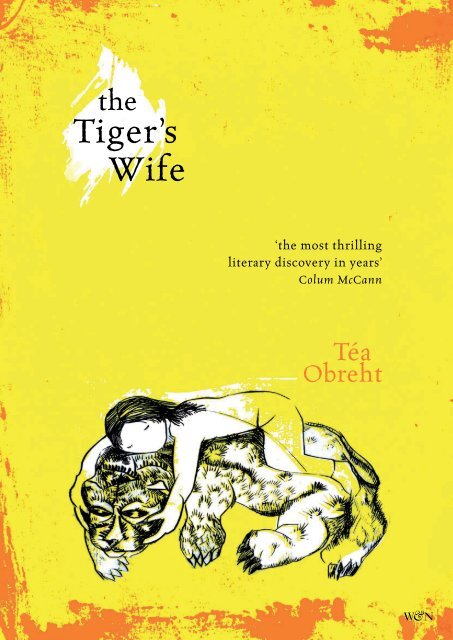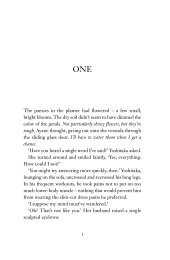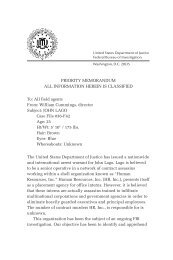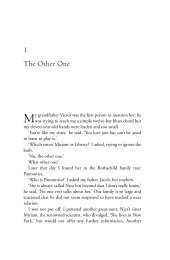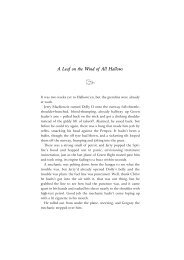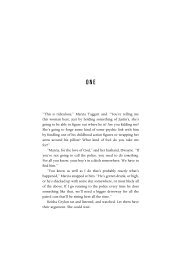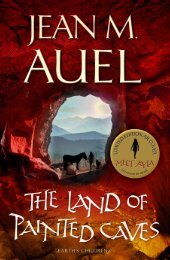Create successful ePaper yourself
Turn your PDF publications into a flip-book with our unique Google optimized e-Paper software.
<strong>The</strong><br />
Tiger’s <strong>Wife</strong><br />
c<br />
Téa Obreht<br />
Weidenfeld & Nicolson<br />
london
First published in Great Britain in 2011<br />
by Weidenfeld & Nicolson<br />
An imprint of the Orion Publishing Group Ltd<br />
Orion House, 5 Upper St Martin’s Lane<br />
London wc2h 9ea<br />
An Hachette UK Company<br />
© Téa Obreht 2011<br />
1 3 5 7 9 10 8 6 4 2<br />
All rights reserved. No part of this publication may be<br />
reproduced, stored in a retrieval system, or transmitted,<br />
in any form or by any means, electronic, mechanical,<br />
photocopying, recording or otherwise, without the prior<br />
permission of both the copyright owner and the<br />
above publisher.<br />
Portions of this book appeared previously in<br />
<strong>The</strong> New Yorker in a different form<br />
<strong>The</strong> right of Téa Obreht to be identified as the author<br />
of this work has been asserted in accordance with the<br />
Copyright, Designs and Patents Act 1988.<br />
A CIP catalogue record for this book<br />
is available from the British Library<br />
978 0 297 85901 7 (cased)<br />
978 0 297 85902 4 (trade paperback)<br />
Printed and bound in Great Britain by Clays Ltd, St Ives plc<br />
This book is a work of fiction. Names, characters, places and<br />
incidents either are the product of the author’s imagination or are<br />
used fictitiously, and any resemblance to actual persons living or dead,<br />
events or locales is entirely coincidental.<br />
<strong>The</strong> Orion Publishing Group’s policy is to use papers that are natural,<br />
renewable and recyclable products and made from wood grown in<br />
sustainable forests. <strong>The</strong> logging and manufacturing processes are expected<br />
to conform to the environmental regulations of the country of origin.
For Štefan Obreht
In my earliest memory, my grandfather is bald as a stone and he<br />
takes me to see the tigers. He puts on his hat, his big-buttoned<br />
raincoat, and I wear my lacquered shoes and velvet dress. It is autumn,<br />
and I am four years old. <strong>The</strong> certainty of this process: my<br />
grandfather’s hand, the bright hiss of the trolley, the dampness of<br />
the morning, the crowded walk up the hill to the citadel park.<br />
Always in my grandfather’s breast pocket: <strong>The</strong> Jungle Book, with<br />
its gold-leaf cover and old yellow pages. I am not allowed to hold<br />
it, but it will stay open on his knee all afternoon while he recites<br />
the passages to me. Even though my grandfather is not wearing<br />
his stethoscope or white coat, the lady at the ticket counter in<br />
the entrance shed calls him “Doctor.”<br />
<strong>The</strong>n there is the popcorn cart, the umbrella stand, a small<br />
kiosk with postcards and pictures. Down the stairs and past the<br />
aviary where the sharp-eared owls sleep, through the garden that<br />
runs the length of the citadel wall, framed with cages. Once there<br />
was a king here, a sultan, his Janissaries. Now the cannon windows<br />
facing the street hold blocked-off troughs filled with tepid<br />
water. <strong>The</strong> cage bars curve out, rusted orange. In his free hand,<br />
my grandfather is carrying the blue bag my grandma has prepared<br />
for us. In it: six-day-old cabbage heads for the hippopotamus,<br />
carrots and celery for the sheep and deer and the bull
<strong>The</strong> Tiger’s <strong>Wife</strong><br />
moose, who is a kind of phenomenon. In his pocket, my grandfather<br />
has hidden some sugar cubes for the pony that pulls the<br />
park carriage. I will not remember this as sentimentality, but as<br />
greatness.<br />
<strong>The</strong> tigers live in the outer moat of the fortress. We climb the<br />
castle stairs, past the waterbirds and the sweating windows of the<br />
monkey house, past the wolf growing his winter coat. We pass<br />
the bearded vultures and then the bears, asleep all day, smelling<br />
of damp earth and the death of something. My grandfather picks<br />
me up and props my feet against the handrail so I can look down<br />
and see the tigers in the moat.<br />
My grandfather never refers to the tiger’s wife by name. His<br />
arm is around me and my feet are on the handrail, and my grandfather<br />
might say, “I once knew a girl who loved tigers so much<br />
she almost became one herself.” Because I am little, and my love<br />
of tigers comes directly from him, I believe he is talking about<br />
me, offering me a fairy tale in which I can imagine myself—and<br />
will, for years and years.<br />
<strong>The</strong> cages face a courtyard, and we go down the stairs and<br />
walk slowly from cage to cage. <strong>The</strong>re is a panther, too, ghost spots<br />
paling his oil-slick coat; a sleepy, bloated lion from Africa. But<br />
the tigers are awake and livid, bright with rancor. Stripe-lashed<br />
shoulders rolling, they flank one another up and down the narrow<br />
causeway of rock, and the smell of them is sour and warm<br />
and fills everything. It will stay with me the whole day, even after<br />
I have had my bath and gone to bed, and will return at random<br />
times: at school, at a friend’s birthday party, even years later, at<br />
the pathology lab, or on the drive home from Galina.<br />
I remember this, too: an altercation. A small group of people<br />
stand clustered around the tigers’ cage. Among them: a boy with<br />
a parrot-shaped balloon, a woman in a purple coat, and a
5<br />
bearded man who is wearing the brown uniform of a zookeeper.<br />
<strong>The</strong> man has a broom and a dustpan on a long handle, and he is<br />
sweeping the area between the cage and the outer railing. He<br />
walks up and down, sweeping up juice boxes and candy wrappers,<br />
bits of popcorn people have tried to throw at the tigers. <strong>The</strong><br />
tigers walk up and down with him. <strong>The</strong> woman in purple is saying<br />
something and smiling, and he smiles back at her. She has<br />
brown hair. <strong>The</strong> dustpan keeper stops and leans against the handle<br />
of his broom, and as he does so, the big tiger sweeps by, rubbing<br />
against the bars of the cage, rumbling, and the keeper puts a<br />
hand through the bars and touches its flank. For a moment, nothing.<br />
And then pandemonium.<br />
<strong>The</strong> tiger rounds on him and the woman shrieks, and suddenly<br />
the dustpan keeper’s shoulder is between the bars, and he is<br />
twisting, twisting his head away and trying to reach for the outer<br />
railing so that he has something to hold on to. <strong>The</strong> tiger has the<br />
dustpan keeper’s arm the way a dog holds a large bone: upright<br />
between his paws, gnawing on the top. Two men who have been<br />
standing by with children jump over the railing and grab the<br />
dustpan keeper’s waist and flailing arm and try to pull him away.<br />
A third man jams his umbrella through the bars and pushes it<br />
over and over again into the tiger’s ribs. An outraged scream<br />
from the tiger, and then it stands up on its hind legs and hugs the<br />
dustpan keeper’s arm and shakes its head from side to side, like<br />
it’s pulling on rope. Its ears are flattened, and it is making a noise<br />
like a locomotive. <strong>The</strong> dustpan keeper’s face is white, and this entire<br />
time he hasn’t made a sound.<br />
<strong>The</strong>n suddenly, it’s no longer worth it, and the tiger lets go.<br />
<strong>The</strong> three men fall away, and there is a splatter of blood. <strong>The</strong><br />
tiger is lashing its tail, and the dustpan keeper is crawling under<br />
the outer railing and standing up. <strong>The</strong> woman in purple has van-
<strong>The</strong> Tiger’s <strong>Wife</strong><br />
ished. My grandfather has not turned away. I am four years old,<br />
but he has not turned me away, either. I see it all, and, later, there<br />
is the fact that he wants me to have seen.<br />
<strong>The</strong>n the dustpan keeper is hurrying our way, winding a piece<br />
of torn shirt across his arm. He is red-faced and angry, on his way<br />
to the infirmary. At the time, I believe this is fear, but later I will<br />
know it as embarrassment, as shame. <strong>The</strong> tigers, agitated, are<br />
lunging back and forth across the grate. <strong>The</strong> keeper is leaving a<br />
dark trail on the gravel behind him. As he passes us, my grandfather<br />
says: “My God, you’re a fool, aren’t you?” and the man says<br />
something in reply, something I know not to repeat.<br />
Instead, shrill and self-righteous in my lacquered boots, brave<br />
because my grandfather is holding my hand, I say: “He’s a fool,<br />
isn’t he, Grandpa?”<br />
But my grandfather is already walking after the dustpan<br />
keeper, pulling me along, calling for the man to stop so he can<br />
help him.
1<br />
THE COAST<br />
the forty days of the soul begin on the morning<br />
after death. That first night, before its forty days begin, the soul<br />
lies still against sweated-on pillows and watches the living fold<br />
the hands and close the eyes, choke the room with smoke and silence<br />
to keep the new soul from the doors and the windows and<br />
the cracks in the floor so that it does not run out of the house like<br />
a river. <strong>The</strong> living know that, at daybreak, the soul will leave<br />
them and make its way to the places of its past—the schools and<br />
dormitories of its youth, army barracks and tenements, houses<br />
razed to the ground and rebuilt, places that recall love and guilt,<br />
difficulties and unbridled happiness, optimism and ecstasy, memories<br />
of grace meaningless to anyone else—and sometimes this<br />
journey will carry it so far for so long that it will forget to come<br />
back. For this reason, the living bring their own rituals to a standstill:<br />
to welcome the newly loosed spirit, the living will not clean,<br />
will not wash or tidy, will not remove the soul’s belongings for<br />
forty days, hoping that sentiment and longing will bring it home<br />
again, encourage it to return with a message, with a sign, or with<br />
forgiveness.<br />
If it is properly enticed, the soul will return as the days go by,<br />
to rummage through drawers, peer inside cupboards, seek the<br />
tactile comfort of its living identity by reassessing the dish rack
<strong>The</strong> Tiger’s <strong>Wife</strong><br />
and the doorbell and the telephone, reminding itself of functionality,<br />
all the time touching things that produce sound and make<br />
its presence known to the inhabitants of the house.<br />
Speaking quietly into the phone, my grandma reminded me of<br />
this after she told me of my grandfather’s death. For her, the forty<br />
days were fact and common sense, knowledge left over from<br />
burying two parents and an older sister, assorted cousins and<br />
strangers from her hometown, a formula she had recited to<br />
comfort my grandfather whenever he lost a patient in whom he<br />
was particularly invested—a superstition, according to him, but<br />
something in which he had indulged her with less and less<br />
protest as old age had hardened her beliefs.<br />
My grandma was shocked, angry because we had been robbed<br />
of my grandfather’s forty days, reduced now to thirty-seven or<br />
thirty-eight by the circumstances of his death. He had died alone,<br />
on a trip away from home; she hadn’t known that he was already<br />
dead when she ironed his clothes the day before, or washed the<br />
dishes that morning, and she couldn’t account for the spiritual<br />
consequences of her ignorance. He had died in a clinic in an obscure<br />
town called Zdrevkov on the other side of the border; no<br />
one my grandma had spoken to knew where Zdrevkov was, and<br />
when she asked me, I told her the truth: I had no idea what he<br />
had been doing there.<br />
“You’re lying,” she said.<br />
“Bako, I’m not.”<br />
“He told us he was on his way to meet you.”<br />
“That can’t be right,” I said.<br />
He had lied to her, I realized, and lied to me. He had taken advantage<br />
of my own cross-country trip to slip away—a week ago,<br />
she was saying, by bus, right after I had set out myself—and had<br />
gone off for some reason unknown to either of us. It had taken<br />
the Zdrevkov clinic staff three whole days to track my grandma
9<br />
down after he died, to tell her and my mother that he was dead,<br />
arrange to send his body. It had arrived at the City morgue that<br />
morning, but by then, I was already four hundred miles from<br />
home, standing in the public bathroom at the last service station<br />
before the border, the pay phone against my ear, my pant legs<br />
rolled up, sandals in hand, bare feet slipping on the green tiles<br />
under the broken sink.<br />
Somebody had fastened a bent hose onto the faucet, and it<br />
hung, nozzle down, from the boiler pipes, coughing thin streams<br />
of water onto the floor. It must have been going for hours: water<br />
was everywhere, flooding the tile grooves and pooling around the<br />
rims of the squat toilets, dripping over the doorstep and into the<br />
dried-up garden behind the shack. None of this fazed the bathroom<br />
attendant, a middle-aged woman with an orange scarf tied<br />
around her hair, whom I had found dozing in a corner chair and<br />
dismissed from the room with a handful of bills, afraid of what<br />
those seven missed beeper pages from my grandma meant before<br />
I even picked up the receiver.<br />
I was furious with her for not having told me that my grandfather<br />
had left home. He had told her and my mother that he was<br />
worried about my goodwill mission, about the inoculations at<br />
the Brejevina orphanage, and that he was coming down to help.<br />
But I couldn’t berate my grandma without giving myself away,<br />
because she would have told me if she had known about his illness,<br />
which my grandfather and I had hidden from her. So I let<br />
her talk, and said nothing about how I had been with him at the<br />
Military Academy of Medicine three months before when he had<br />
found out, or how the oncologist, a lifelong colleague of my<br />
grandfather’s, had shown him the scans and my grandfather had<br />
put his hat down on his knee and said, “Fuck. You go looking for<br />
a gnat and you find a donkey.”<br />
I put two more coins into the slot, and the phone whirred.
<strong>The</strong> Tiger’s <strong>Wife</strong><br />
Sparrows were diving from the brick ledges of the bathroom<br />
walls, dropping into the puddles at my feet, shivering water over<br />
their backs. <strong>The</strong> sun outside had baked the early afternoon into<br />
stillness, and the hot, wet air stood in the room with me, shining<br />
in the doorway that led out to the road, where the cars at border<br />
control were packed in a tight line along the glazed tarmac. I<br />
could see our car, left side dented from a recent run-in with a<br />
tractor, and Zóra sitting in the driver’s seat, door propped open,<br />
one long leg dragging along the ground, glances darting back<br />
toward the bathroom more and more often as she drew closer to<br />
the customs booth.<br />
“<strong>The</strong>y called last night,” my grandma was saying, her voice<br />
louder. “And I thought, they’ve made a mistake. I didn’t want to<br />
call you until we were sure, to worry you in case it wasn’t him.<br />
But your mother went down to the morgue this morning.” She<br />
was quiet, and then: “I don’t understand, I don’t understand any<br />
of it.”<br />
“I don’t either, Bako,” I said.<br />
“He was going to meet you.”<br />
“I didn’t know about it.”<br />
<strong>The</strong>n the tone of her voice changed. She was suspicious, my<br />
grandma, of why I wasn’t crying, why I wasn’t hysterical. For the<br />
first ten minutes of our conversation, she had probably allowed<br />
herself to believe that my calm was the result of my being in a<br />
foreign hospital, on assignment, surrounded, perhaps, by colleagues.<br />
She would have challenged me a lot sooner if she had<br />
known that I was hiding in the border-stop bathroom so that<br />
Zóra wouldn’t overhear.<br />
She said, “Haven’t you got anything to say?”<br />
“I just don’t know, Bako. Why would he lie about coming to<br />
see me?”
11<br />
“You haven’t asked if it was an accident,” she said. “Why<br />
haven’t you asked that? Why haven’t you asked how he died?”<br />
“I didn’t even know he had left home,” I said. “I didn’t know<br />
any of this was going on.”<br />
“You’re not crying,” she said.<br />
“Neither are you.”<br />
“Your mother is heartbroken,” she said to me. “He must have<br />
known. <strong>The</strong>y said he was very ill—so he must have known, he<br />
must have told someone. Was it you?”<br />
“If he had known, he wouldn’t have gone anywhere,” I said,<br />
with what I hoped was conviction. “He would have known better.”<br />
<strong>The</strong>re were white towels stacked neatly on a metal shelf<br />
above the mirror, and I wiped my face and neck with one, and<br />
then another, and the skin of my face and neck left gray smears<br />
on towel after towel until I had used up five. <strong>The</strong>re was no laundry<br />
basket to put them in, so I left them in the sink. “Where is<br />
this place where they found him?” I said. “How far did he go?”<br />
“I don’t know,” she said. “<strong>The</strong>y didn’t tell us. Somewhere on<br />
the other side.”<br />
“Maybe it was a specialty clinic,” I said.<br />
“He was on his way to see you.”<br />
“Did he leave a letter?”<br />
He hadn’t. My mother and grandma, I realized, had both<br />
probably seen his departure as part of his unwillingness to retire,<br />
like his relationship with a new housebound patient outside the<br />
City—a patient we had made up as a cover for his visits to the<br />
oncologist friend from the weekly doctors’ luncheon, a man who<br />
gave injections of some formulas that were supposed to help<br />
with the pain. Colorful formulas, my grandfather said when he<br />
came home, as if he knew the whole time that the formulas were<br />
just water laced with food coloring, as if it didn’t matter any-
<strong>The</strong> Tiger’s <strong>Wife</strong><br />
more. He had, at first, more or less retained his healthy cast,<br />
which made hiding his illness easier; but after seeing him come<br />
out of these sessions just once, I had threatened to tell my<br />
mother, and he said: “Don’t you dare.” And that was that.<br />
My grandma was asking me: “Are you already in Brejevina?”<br />
“We’re at the border,” I said. “We just came over on the ferry.”<br />
Outside, the line of cars was beginning to move again. I saw<br />
Zóra put her cigarette out on the ground, pull her leg back in and<br />
slam the door. A flurry of people who had assembled on the<br />
gravel shoulder to stretch and smoke, to check their tires and fill<br />
water bottles at the fountain, to look impatiently down the line,<br />
or dispose of pastries and sandwiches they had been attempting<br />
to smuggle, or urinate against the side of the bathroom, scrambled<br />
to get back to their vehicles.<br />
My grandma was silent for a few moments. I could hear the<br />
line clicking, and then she said: “Your mother wants to have the<br />
funeral in the next few days. Couldn’t Zóra go on to Brejevina by<br />
herself?”<br />
If I had told Zóra about it, she would have made me go home<br />
immediately. She would have given me the car, taken the vaccine<br />
coolers, and hitchhiked across the border to make the University’s<br />
good-faith delivery to the orphanage at Brejevina up the<br />
coast. But I said: “We’re almost there, Bako, and a lot of kids are<br />
waiting on these shots.”<br />
She didn’t ask me again. My grandma just gave me the date of<br />
the funeral, the time, the place, even though I already knew<br />
where it would be, up on Strmina, the hill overlooking the City,<br />
where Mother Vera, my great-great-grandmother, was buried.<br />
After she hung up, I ran the faucet with my elbow and filled the<br />
water bottles I had brought as my pretext for getting out of the<br />
car. On the gravel outside, I rinsed off my feet before putting my<br />
shoes back on; Zóra left the engine running and jumped out to
13<br />
take her turn while I climbed into the driver’s seat, pulled it forward<br />
to compensate for my height, and made sure our licenses<br />
and medication import documents were lined up in the correct<br />
order on the dashboard. Two cars in front of us, a customs official,<br />
green shirt clinging to his chest, was opening the hatchback<br />
of an elderly couple’s car, leaning carefully into it, unzipping suitcases<br />
with a gloved hand.<br />
When Zóra got back, I didn’t tell her anything about my<br />
grandfather. It had already been a bleak year for us both. I had<br />
made the mistake of walking out with the nurses during the<br />
strike in January; rewarded for my efforts with an indefinite suspension<br />
from the Vojvodja clinic, I had been housebound for<br />
months—a blessing, in a way, because it meant I was around for<br />
my grandfather when the diagnosis came in. He was glad of it at<br />
first, but never passed up the opportunity to call me a gullible<br />
jackass for getting suspended. And then, as his illness wore on, he<br />
began spending less and less time at home, and suggested I do the<br />
same; he didn’t want me hanging around, looking morose, scaring<br />
the hell out of him when he woke up without his glasses on to<br />
find me hovering over his bed in the middle of the night. My behavior,<br />
he said, was tipping my grandma off about his illness,<br />
making her suspicious of our silences and exchanges, and of the<br />
fact that my grandfather and I were busier than ever now that<br />
we were respectively retired and suspended. He wanted me to<br />
think about my specialization, too, about what I would do with<br />
myself once the suspension was lifted—he was not surprised that<br />
Srdjan, a professor of biochemical engineering with whom I had,<br />
according to my grandfather, “been tangling,” had failed to put in<br />
a good word for me with the suspension committee. At my<br />
grandfather’s suggestion, I had gone back to volunteering with<br />
the University’s United Clinics program, something I hadn’t<br />
done since the end of the war.
<strong>The</strong> Tiger’s <strong>Wife</strong><br />
Zóra was using this volunteering mission as an excuse to get<br />
away from a blowup at the Military Academy of Medicine. Four<br />
years after getting her medical degree, she was still at the trauma<br />
center, hoping that exposure to a variety of surgical procedures<br />
would help her decide on a specialization. Unfortunately, she<br />
had spent the bulk of that time under a trauma director known<br />
throughout the City as Ironglove—a name he had earned during<br />
his days as chief of obstetrics, when he had failed to remove the<br />
silver bracelets he kept stacked on his wrist during pelvic examinations.<br />
Zóra was a woman of principle, an open atheist. At the<br />
age of thirteen, a priest had told her that animals had no souls,<br />
and she had said, “Well then, fuck you, Pops,” and walked out of<br />
church; four years of butting heads with Ironglove had culminated<br />
in an incident that Zóra, under the direction of the state<br />
prosecutor, was prohibited from discussing. Zóra’s silence on the<br />
subject extended even to me, but the scraps I had heard around<br />
hospital hallways centered around a railway worker, an accident,<br />
and a digital amputation during which Ironglove, who may or<br />
may not have been inebriated, had said something like: “Don’t<br />
worry, sir—it’s a lot easier to watch the second finger come off if<br />
you’re biting down on the first.”<br />
Naturally, a lawsuit was in the works, and Zóra had been summoned<br />
back to testify against Ironglove. Despite his reputation,<br />
he was still well connected in the medical community, and now<br />
Zóra was torn between sticking it to a man she had despised for<br />
years, and risking a career and reputation she was just beginning<br />
to build for herself; for the first time no one—not me, not her father,<br />
not her latest boyfriend—could point her in the right direction.<br />
After setting out, we had spent a week at the United Clinics<br />
headquarters for our briefing and training, and all this time she<br />
had met both my curiosity and the state prosecutor’s incessant<br />
phone calls with the same determined silence. <strong>The</strong>n yesterday,
15<br />
against all odds, she had admitted to wanting my grandfather’s<br />
advice as soon as we got back to the City. She hadn’t seen him<br />
around the hospital for the past month, hadn’t seen his graying<br />
face, the way his skin was starting to loosen around his bones.<br />
We watched the customs officer confiscate two jars of beach<br />
pebbles from the elderly couple, and wave the next car through;<br />
when he got to us, he spent twenty minutes looking over our<br />
passports and identity cards, our letters of certification from the<br />
University. He opened the medicine coolers and lined them up<br />
on the tarmac while Zóra towered over him, arms crossed, and<br />
then said, “You realize, of course, that the fact that it’s in a cooler<br />
means it’s temperature-sensitive—or don’t they teach you about<br />
refrigeration at the village schoolhouse?” knowing that everything<br />
was in order, knowing that, realistically, he couldn’t touch<br />
us. This challenge, however, prompted him to search the car for<br />
weapons, stowaways, shellfish, and uncertified pets for a further<br />
thirty minutes.<br />
Twelve years ago, before the war, the people of Brejevina had<br />
been our people. <strong>The</strong> border had been a joke, an occasional formality,<br />
and you used to drive or fly or walk across as you pleased,<br />
by woodland, by water, by open plain. You used to offer the customs<br />
officials sandwiches or jars of pickled peppers as you went<br />
through. Nobody asked you your name—although, as it turned<br />
out, everyone had apparently been anxious about it all along,<br />
about how your name started and ended. Our assignment in Brejevina<br />
was intended to rebuild something. Our University<br />
wanted to collaborate with the local government in getting several<br />
orphanages on their feet, and to begin attracting young people<br />
from across the border back to the City. That was the<br />
long-term diplomatic objective of our journey—but in layman’s<br />
terms Zóra and I were there to sanitize children orphaned by our<br />
own soldiers, to examine them for pneumonia and tuberculosis
<strong>The</strong> Tiger’s <strong>Wife</strong><br />
and lice, to inoculate them against measles, mumps, rubella, and<br />
other assorted diseases to which they had been subjected during<br />
the war and the years of destitution that followed it. Our contact<br />
in Brejevina, a Franciscan monk named Fra Antun, had been enthusiastic<br />
and hospitable, paging us to make sure our journey was<br />
unencumbered, and to assure us that his parents, conveniently<br />
enough, were looking forward to hosting us. His voice was always<br />
cheerful, especially for a man who had spent the last three years<br />
fighting to fund the establishment and construction of the first<br />
official orphanage on the coast, and who was, in the meantime,<br />
housing sixty orphaned children at a monastery intended to accommodate<br />
twenty monks.<br />
Zóra and I were joining up for this charitable trip before our<br />
lives took us apart for the first time in the twenty-some-odd<br />
years we had known each other. We would wear our white doctors’<br />
coats even off duty in order to appear simultaneously trustworthy<br />
and disconcerting. We were formidable with our four<br />
supplies coolers loaded with vials of MMR-II and IPV, with<br />
boxes of candy we were bringing to stave off the crying and<br />
screaming we felt certain would ensue once the inoculation got<br />
going. We had an old map, which we kept in the car years after it<br />
had become completely inaccurate. We had used the map on<br />
every road trip we had ever taken, and it showed in the marker<br />
scribbling all over it: the crossed-out areas we were supposed to<br />
avoid on our way to some medical conference or other, the stick<br />
man holding crudely drawn skis on a mountain resort we had<br />
loved that was no longer a part of our country.<br />
I couldn’t find Zdrevkov, the place where my grandfather<br />
died, on that map. I couldn’t find Brejevina either, but I had<br />
known in advance that it was missing, so we had drawn it in. It<br />
was a small seaside village forty kilometers east of the new border.<br />
We drove through red-roofed villages that clung to the lip of
17<br />
the sea, past churches and horse pastures, past steep plains bright<br />
with purple bellflowers, past sunlit waterfalls that thrust out of<br />
the sheer rock-face above the road. Every so often we entered<br />
woodland, high pine forests dotted with olives and cypresses, the<br />
sea flashing like a knife where the forest fell away down the<br />
slope. Parts of the road were well paved, but there were places<br />
where it ripped up into ruts and stretches of gravel that hadn’t<br />
been fixed in years.<br />
<strong>The</strong> car was pitching up and down through the ruts on the<br />
shoulder, and I could hear the glass vials in the cooler shivering.<br />
Thirty kilometers out of Brejevina, we started to see more signs<br />
for pensions and restaurants, tourist places that were slowly beginning<br />
to rely on the offshore islands for business again. We<br />
started seeing fruit and specialty food stands, signs for homemade<br />
pepper cookies and grape-leaf rakija, local honey, sour<br />
cherry and fig preserves. I had three missed pages from my<br />
grandmother, but Zóra had the mobile, and there was no way to<br />
call my grandma back with Zóra in the car. We pulled over at the<br />
next rest-stop with a pay phone, a roadside barbecue stand with<br />
a blue awning and an outhouse in the adjacent field.<br />
<strong>The</strong>re was a truck parked on the other side of the stand, and a<br />
long line of soldiers crowding at the barbecue counter. <strong>The</strong> men<br />
were in camouflage. <strong>The</strong>y fanned themselves with their hats and<br />
waved when I got out of the car and headed for the phone booth.<br />
Some local gypsy kids, handing out pamphlets for a new nightclub<br />
in Brac, laughed at me through the glass. <strong>The</strong>n they ran to<br />
the side of the car to bum cigarettes from Zóra.<br />
From the booth, I could see the army truck, with its dusty,<br />
folded tarp, and the grill of Boro’s Beefs, where a large man,<br />
probably Boro himself, was flipping burger patties and veal<br />
shoulders and sausages with the flat part of an enormous knife.<br />
Behind the stand, a little way across the field, there was a funny-
<strong>The</strong> Tiger’s <strong>Wife</strong><br />
looking brown cow tied to a post in the ground—I suddenly got<br />
the feeling that Boro would routinely use that knife for the cow,<br />
and the butchering, and the flipping of the burgers, and the cutting<br />
of bread, which made me feel a little sorry for the soldier<br />
standing by the condiment counter, spooning diced onions all<br />
over his sandwich.<br />
I hadn’t noticed my headache while I had been driving, but<br />
now it hit me when my grandma picked up after the sixth ring,<br />
and her voice was followed by the sharp sound of her hearing aid<br />
lancing through the phone line and into the base of my skull.<br />
<strong>The</strong>re were soft beeps as she turned it down. I could hear my<br />
mother’s voice in the background, quiet but determined, talking<br />
with some other consoler who had come to pay a call.<br />
My grandma was hysterical. “His things are gone.”<br />
I told her to calm down, asked her to explain.<br />
“His things!” she said. “Your grandfather’s things, they’re—<br />
your mother went down to the morgue, and they had his suit and<br />
coat and shoes, but his things, Natalia—they’re all gone, they’re<br />
not there with him.”<br />
“What things?”<br />
“Look, God—‘what things’!” I heard her slap her hands together.<br />
“Do you hear me? I’m telling you his things are gone—<br />
those bastards at the clinic, they stole them, they stole his hat<br />
and umbrella, his wallet. Think—can you believe it? To steal<br />
things from a dead man.”<br />
I could believe it, having heard things about it at our own hospital.<br />
It happened, usually to the unclaimed dead, and often with<br />
very little reprimand. But I said, “Sometimes there’s a mix-up. It<br />
can’t have been a very big clinic, Bako. <strong>The</strong>re might be a delay.<br />
Maybe they forgot to send them.”<br />
“His watch, Natalia.”<br />
“Please, Bako.” I thought of his coat pocket, and of <strong>The</strong> Jungle
19<br />
Book, and wanted to ask if it, too, was missing; but as far as I<br />
knew, my grandma had not cried yet, and I was terrified of saying<br />
something that would make her cry. I must have thought of the<br />
deathless man at this moment; but the thought was so far away I<br />
wouldn’t find it again until later.<br />
“His watch.”<br />
“Do you have the number of the clinic?” I said. “Have you<br />
called them?”<br />
“I’m calling and calling,” she said. “<strong>The</strong>re’s no answer. Nobody’s<br />
there. <strong>The</strong>y’ve taken his things. God, Natalia, his glasses—<br />
they’re gone.”<br />
His glasses, I thought—the way he would clean them, put almost<br />
the whole lens in his mouth to blow on it before wiping it<br />
clean with the little silk cloth he kept in his pocket—and a cold<br />
stiffness crept into my ribs and stayed there.<br />
“What kind of place is this, where he died?” my grandma was<br />
saying. Her voice, hoarse from shouting, was beginning to break.<br />
“I don’t know, Bako,” I said. “I wish I had known he had gone.”<br />
“None of it would be like this—but you have to lie, the pair of<br />
you, always whispering about something. He’s lying, you’re<br />
lying.” I heard my mother try to take the phone from her, and my<br />
grandma said, “No.” I was watching Zóra get out of the car. She<br />
straightened up slowly and locked the car door, leaving the<br />
cooler on the floor of the passenger side. <strong>The</strong> gypsy kids were<br />
leaning against the back bumper, passing a cigarette back and<br />
forth. “You’re sure he didn’t leave a note?” My grandma asked me<br />
what kind of note, and I said, “Anything. Any kind of message.”<br />
“I’m telling you, I don’t know,” she said.<br />
“What did he say when he left?”<br />
“That he was coming to you.”<br />
It was my turn to be suspicious, to calculate who had known<br />
what, and how much of it no one had known at all. He had been
<strong>The</strong> Tiger’s <strong>Wife</strong><br />
counting on the pattern into which we had fallen as a family over<br />
the years, the tendency to lie about each other’s physical condition<br />
and whereabouts to spare one another’s feelings and fears;<br />
like the time my mother had broken her leg falling off the lakehouse<br />
garage at Verimovo, and we had told my grandparents that<br />
we were delaying our trip home because the house had flooded;<br />
or the time my grandmother had had open-heart surgery at a<br />
clinic in Strekovac while my mother and I, blissfully oblivious,<br />
vacationed in Venice, and my grandfather, lying into a telephone<br />
line that was too scrambled to be anything but our own, insisted<br />
that he had taken my grandma on an impromptu spa trip to<br />
Luzern.<br />
“Let me have the phone number of that clinic in Zdrevkov,”<br />
I said.<br />
“Why?” my grandma said, still suspicious.<br />
“Just let me have it.” I had a wrinkled receipt in my coat<br />
pocket, and I propped it against the glass. <strong>The</strong> only pencil I had<br />
was worn to a stub; my grandfather’s influence, the habit of using<br />
the same pencil until it couldn’t fit between his fingers anymore.<br />
I wrote the number down.<br />
Zóra was waving at me and pointing in the direction of Boro<br />
and his beefs, and the crowd at the counter, and I shook my head<br />
at her and looked on in desperation as she crossed the mud ruts<br />
on the shoulder and got in line behind a blue-eyed soldier who<br />
couldn’t have been more than nineteen. I saw him look her up<br />
and down less than discreetly, and then Zóra said something I<br />
couldn’t hear. <strong>The</strong> roar of laughter that erupted from the soldiers<br />
around the blue-eyed kid was audible even in the phone booth,<br />
however, and the kid’s ears went red. Zóra gave me a satisfied<br />
look, and then continued to stand there with her arms across her<br />
chest, eyeing the chalkboard menu above a drawing of a cow
21<br />
wearing a purple hat, which looked a lot like the cow tied up out<br />
back.<br />
“Where are you girls now?” my grandma said.<br />
“We’ll be in Brejevina by nightfall,” I said. “We’ll do the shots<br />
and come straight home. I promise I’ll try to be home by the day<br />
after tomorrow.” She didn’t say anything. “I’ll call the clinic in<br />
Zdrevkov,” I said, “and if it’s on the way home I’ll go by and get<br />
his things, Bako.”<br />
“I still don’t know,” she finally said, “how none of us knew.”<br />
She was waiting for me to admit that I had known. “You’re lying<br />
to me,” she said.<br />
“I don’t know anything, Bako.”<br />
She wanted me to say that I had seen the symptoms but ignored<br />
them, or that I had spoken to him about it, anything to<br />
comfort her in her fear that, despite being with us, he had been<br />
totally alone with the knowledge of his own death.<br />
“<strong>The</strong>n swear to me,” she said. “Swear to me on my life that you<br />
didn’t know.”<br />
It was my turn to be silent. She listened for my oath, but when<br />
it didn’t come, she said: “It must be hot out there. Are you girls<br />
drinking plenty of water?”<br />
“We’re fine.”<br />
A pause. “If you eat meat, make sure it’s not pink in the<br />
middle.”<br />
I told her I loved her, and she hung up without a word. I held<br />
the dead receiver against my head for a few more minutes, and<br />
then I called the clinic in Zdrevkov. You could always tell the<br />
backwater places because it would take forever to connect, and<br />
when it did, the sound was distant and muffled.<br />
I let the line ring to silence twice, and then tried once more<br />
before hanging up and getting in line with Zóra, who had already
<strong>The</strong> Tiger’s <strong>Wife</strong><br />
locked horns with Boro trying to order what our city joints called<br />
a “strengthened burger,” with extra onions. Boro told her that this<br />
was Brejevina, and that she could have a double burger if she<br />
wanted, but he had never heard of a strengthened burger, and<br />
what the hell was that? <strong>The</strong> stand was cluttered with coolers of<br />
raw meat and cast-iron soup pots brimming with something<br />
brown and oily. Behind the counter, Boro was terse, and he<br />
wanted exact change, probably to stick it to us for that strengthened<br />
burger. Zóra held her sandwich in one hand and mine in the<br />
other while I went through her coat pockets for her wallet.<br />
“You heard of a place called Zdrevkov?” I asked Boro, leaning<br />
over the counter with the pink and blue notes in my hand. “You<br />
know where it is?”<br />
He didn’t.<br />
At seven-thirty, the sun banking low into a distant cover of<br />
blue clouds, we came within sight of Brejevina and turned off the<br />
highway to follow the town road to the sea. <strong>The</strong> town was<br />
smaller than I had expected, with a palm-lined boardwalk that<br />
ran tight between the shore and the shops and restaurants that<br />
spilled out into our path, coffeehouse chairs and postcard stands<br />
in the middle of the road, kids on bicycles hitting the back of the<br />
car with open hands. It was too early for the tourist season to be<br />
in full swing, but, with the windows down, I could hear Polish<br />
and Italian as we rolled slowly past the convenience store and the<br />
post office, the monastery square where we would be setting up<br />
the free clinic for the orphanage.<br />
Fra Antun had told us where to find his parents’ house. <strong>The</strong><br />
place was tucked away in a white oleander grove at the farthest<br />
edge of town. It was a modest beachfront house with blue shuttered<br />
windows and a roof of faded shingles, sitting on top of a<br />
natural escarpment in the slope of the mountain, maybe fifty<br />
yards from the sea. <strong>The</strong>re was a big olive tree with what looked
23<br />
like a tire swing out front. <strong>The</strong>re was a henhouse that had apparently<br />
collapsed at least once in the last few years, and been haphazardly<br />
reassembled and propped up against the low stone wall<br />
that ran along the southern edge of the property. A couple of<br />
chickens were milling around the door, and a rooster was sitting<br />
in one of the downstairs window boxes. <strong>The</strong> place looked leftover,<br />
but not defeated. <strong>The</strong>re was something determined about<br />
the way the blue paint clung to the shutters and the door and the<br />
broken crate full of lavender that was leaning against the side of<br />
the house. Fra Antun’s father, Barba Ivan, was a local fisherman.<br />
<strong>The</strong> moment we reached the top of the stairs that led up from<br />
the road, he was already hurrying through the garden. He wore<br />
brown suspenders and sandals, and a bright red vest that must<br />
have cost his wife a fortune at the yarn cart. At his side was a<br />
white dog with a square black head—it was a pointer, but its bigeyed,<br />
excited expression made it look about as useful as a panda.<br />
Barba Ivan was saying, “Hey there, doctors! Welcome, welcome!”<br />
as he came toward us, and he tried to take all of our belongings<br />
at once. After some persuasion, we got him to settle for<br />
Zóra’s suitcase, which he rolled up the cobbled pathway between<br />
the scrub and the roses. Barba Ivan’s wife, Nada, was waiting<br />
at the door, smoking. She had thin white hair and green-river<br />
veins that ran down her neck and bare arms. She kissed our faces<br />
matter-of-factly, and then apologized for the state of the garden<br />
before putting out her cigarette and herding us inside.<br />
Inside, the house was quiet and warm, bright despite the<br />
evening. <strong>The</strong> corridor where we left our shoes opened out into a<br />
small living room with blue-cushioned chairs, and a sofa and<br />
armchair that had obviously been upholstered long ago. Someone<br />
in the house was a painter: an easel, with an unfinished canvas<br />
of what looked like a hound, had been set up by the window,<br />
and paint-splattered newspapers were crowded around it on the
<strong>The</strong> Tiger’s <strong>Wife</strong><br />
floor. Framed watercolors were spaced carefully along the walls,<br />
and it took me a moment to realize that they were all of the same<br />
hound, that beautifully stupid black-headed dog from outside.<br />
<strong>The</strong> windows were all open, and with the outdoor heat came the<br />
electric evening song of the cicadas. Still apologizing for the<br />
mess, Nada led us through to the kitchen, while Barba Ivan took<br />
this opportunity to seize all our luggage—Zóra’s suitcase, my<br />
duffel, our backpacks—and dart up the stairs at the end of the<br />
hall. Nada jostled us into the kitchen and showed us where the<br />
plates and glasses were kept, told us where the bread box was,<br />
opened the fridge and pointed out the milk and the juice and the<br />
pears and the bacon, and told us to have as much of everything<br />
as we wanted whenever we wanted, even the cola.<br />
A red and yellow parrot sat in a tin cage between the kitchen<br />
window and another lopsided watercolor of the black-headed<br />
dog. <strong>The</strong> parrot had been looking suspiciously at Zóra since we<br />
had entered the kitchen, and he took that moment to screech<br />
out: “O! My God! Behold the wonderment!”—an outburst we at<br />
first took as a strikingly lecherous reaction to Zóra’s bare arms<br />
and collarbones. But Nada apologized profusely and dropped a<br />
dishrag over the parrot’s cage.<br />
“He likes to recite poetry,” Nada said, and then we both realized<br />
that the parrot had been trying to begin the prologue of an<br />
old epic poem. “I’ve tried to get him to say things like ‘good<br />
morning’ and ‘I like bread and butter.’ ”<br />
She showed us upstairs. Zóra and I would be sharing a room<br />
with two cots that had been made up with blue paisley quilts.<br />
<strong>The</strong>re was a polished wooden dresser with a few broken drawers,<br />
and a small bathroom with an old-fashioned tub and a chain-pull<br />
toilet we were warned might or might not flush, depending<br />
on the time of day. More sketches of the dog under a fig tree,<br />
another of him sleeping on the downstairs sofa. Our window
25<br />
looked out over the back of the property, the orange and lemon<br />
trees shivering behind it, and, above that, a sloping plain at the<br />
foot of the mountain, lined with rows of low, wind-ruffled vines.<br />
Men were digging among the vines; we could hear the distant<br />
crunch of their shovels, the sound of their voices as they shouted<br />
to one another.<br />
“Our vineyard,” Nada said. “Don’t mind them,” she said about<br />
the diggers, and closed one of the shutters.<br />
By the time we brought the coolers and the boxes in from the<br />
car and stacked them in a corner of our room, dinner was ready.<br />
Nada had fried up sardines and two squid, and grilled a few fish<br />
that were about the size of a man’s hand, and there was nothing<br />
to do but accept her hospitality and cluster around the square<br />
table in the kitchen while Barba Ivan poured us two mugs of<br />
homemade red wine, and the parrot, still under the cover of the<br />
dishrag, burbled to himself and occasionally shrieked out “O!<br />
Hear you thunder? Is that the earth a-shaking?” and, every so<br />
often, in answer to his own question, “No! ’Tis not thunder! Nor<br />
the earth a-shaking!”<br />
Nada served us black bread, chopped green peppers, boiled<br />
potatoes with chard and garlic. She had made a massive effort,<br />
arranged everything carefully on blue china that was chipped,<br />
but lovingly wiped down after probably spending years in a basement,<br />
hidden from looters. <strong>The</strong> cool evening air came in off the<br />
sea from the lower balcony; there were sardines piled high and<br />
caked with salt, two charred bass shining with olive oil—“From<br />
our own olives,” Barba Ivan said, tipping the bottle so that I could<br />
smell the lip. I could picture him sitting earlier that day in a small<br />
dinghy somewhere out in the rolling waters of the bay, the thin<br />
net pulling at his hands, the effort it would take for him to pick<br />
the fish out of the net with those big-jointed brown hands.<br />
Barba Ivan and Nada did not ask us about our drive, about our
<strong>The</strong> Tiger’s <strong>Wife</strong><br />
work, or about our families. Instead, in order to avoid any potential<br />
political or religious tangents, the conversation turned to<br />
crops. <strong>The</strong> spring had been terrible: torrential rains, streams overflowing,<br />
floods that had flushed out the soil up and down the<br />
coast and destroyed lettuces and onions. Tomatoes had been late<br />
coming in, and you couldn’t find spinach anywhere—I remembered<br />
my grandfather coming back from the market with dandelion<br />
leaves that a farmer had passed off as spinach, my grandma<br />
buttering the paper-thin dough for zaljanica and then pulling the<br />
coarse-leafed mass he had brought home out of the grocery bag<br />
and shouting, “What the hell is this?” It was the first time I had<br />
thought about my grandfather in several hours, and the suddenness<br />
of it pushed me into silence. I sat and listened, half-hearing,<br />
as Barba Ivan insisted that the summer, contrary to his expectations,<br />
had been incredible: the oranges and lemons plentiful,<br />
strawberries everywhere, the figs fat and ripe. Zóra was saying, for<br />
us, too, even though I’d never seen her eat a fig in her life.<br />
We had scraped most of the flesh off our respective fishes, unwisely<br />
downed our mugs of red wine, tried to help the parrot<br />
with verses he had apparently committed to memory better than<br />
we ever could, when the child appeared. She was so small I<br />
suspect that none of us would have noticed her if she hadn’t<br />
come in coughing—a thick, loud, productive cough that ripped<br />
through her on the balcony, and then there she was, tiny and<br />
round-bellied, standing in the doorway in mismatched shoes, her<br />
head a mass of tight brownish curls.<br />
<strong>The</strong> child couldn’t have been more than five or six, and she<br />
held on to the door frame, one hand tucked into the pocket of<br />
the yellow summer dress she was wearing. She was a little dusty,<br />
her eyes a little tired, and her entrance had caused a lull in the<br />
conversation, so that when her second cough came we were all<br />
already looking at her. <strong>The</strong>n she put a finger in her ear.
27<br />
“Hello,” I said, “and who are you?”<br />
“God knows,” Nada said, and stood up to clear the plates.<br />
“She’s one of theirs—those people up in the vineyard.” I hadn’t<br />
realized, until that moment, that they were staying here, too. To<br />
the little girl, Nada said, “Where’s your mother?” leaning forward,<br />
speaking very loudly. When the child said nothing, Nada<br />
told her, “Come in for a cookie.”<br />
Barba Ivan leaned back in his chair and reached into the cupboard<br />
behind him. He emerged with a tin of pepper cookies,<br />
lifted the lid and held it out to the child. She didn’t move. Nada<br />
returned from the sink and tried to ply her with a glass of lemonade,<br />
but the child wouldn’t come in: a violet pouch had been tied<br />
around her neck with frayed ribbon, and this she was swinging<br />
with her free hand from one shoulder to the other, occasionally<br />
hitting herself in the chin, and sucking back the green streams of<br />
snot that were inching out of her nose. Outside, we could hear<br />
people returning from the vineyard, dust-hoarsed voices and the<br />
clink of shovels and spades dropping to the ground, feet on the<br />
downstairs patio. <strong>The</strong>y were setting up to have their dinner outside,<br />
at the table under the big olive tree, and Nada said, “We’d<br />
better finish up here,” and started collecting our utensils. Zóra<br />
tried to stand and help, but Nada nudged her back into her seat.<br />
<strong>The</strong> commotion outside had roused the interest of Bis, the dog<br />
who charged out with his ridiculous, ear-swinging lope, nosed the<br />
child in the doorway with mild interest, and then got distracted<br />
by something in the garden.<br />
Barba Ivan was still holding out the cookie box when a thin<br />
young woman swept by the door and swung the child into her<br />
arms. Nada went to the door and looked outside. When she<br />
turned around, she said, “<strong>The</strong>y shouldn’t be here.”<br />
“Sweets aren’t much good for children,” Barba Ivan said to<br />
Zóra, confidentially. “Bad habits before dinner, rots their teeth
<strong>The</strong> Tiger’s <strong>Wife</strong><br />
and such. But what else are we supposed to do? We can’t eat all<br />
this ourselves.”<br />
“It was ridiculous to let them stay,” Nada said, stacking the<br />
dirty plates on the edge of the table.<br />
Barba Ivan was holding the cookie box out to me. “<strong>The</strong>re was<br />
a time when I could eat a whole nut cake, by myself, just sitting<br />
around in the afternoon. But my doctor says, careful! I’m getting<br />
old, he says, I have to be careful.”<br />
“I said this would happen—didn’t I?” Nada said, scraping the<br />
smeared leftovers of the potatoes and chard onto a plate, and<br />
lowering the plate to the floor. “Two or three days—it’s been a<br />
week. Wandering in and out all hours of the night, coughing on<br />
my sheets.”<br />
“<strong>The</strong>y’ve got all kinds of rules now,” Barba Ivan was saying.<br />
“Don’t eat butter, don’t drink beer. This much fruit a day.” He<br />
held his hands apart, indicating a small barrel. “Eat your vegetables.”<br />
“Each one sicker than the next.” This Nada said loudly, leaning<br />
toward the door. “Those children should be in school, or at the<br />
hospital, or with people who can afford to put them in school or<br />
in the hospital.”<br />
“I tell him, listen. I eat my vegetables. Don’t tell me about vegetables:<br />
you buy them at the market, I grow them at my house.”<br />
Barba Ivan opened his hands and counted off tomatoes, peppers,<br />
lettuce, green onions, leeks. “I’m a man who knows vegetables—<br />
but also I’ve eaten bread every day of my life. My father, too, and<br />
he had red wine with every meal. Do you know what my doctor<br />
says?” I shook my head, fixing a smile.<br />
Nada said: “I told you, and I told Antun, I don’t want them<br />
here—and now the doctors have come, and they’re still here,<br />
doing God knows what up there, overturning the whole damn<br />
vineyard. It’s indecent.”
29<br />
“He says it’ll help me live longer. Look, God—why would I<br />
want that?”<br />
“Tell me it’s not dangerous,” Nada said, touching Zóra’s shoulder.<br />
“Tell me, Doctor. Ten of them in two rooms—five to a bed,<br />
and all of them sick as dogs, every single one.”<br />
“Why would I want to live longer if I have to eat—rice, and<br />
this—what do they call it? Prunes.”<br />
“Not that I am suggesting everyone from up your way sleeps<br />
like that. Sleeps five a bed—I’m not saying that at all, Doctor.”<br />
“<strong>The</strong> hell with your prunes.”<br />
“Have you ever heard of such a thing?” Nada asked us both,<br />
wiping her hands on her apron. “Have you?”<br />
“No,” said Zóra obligingly.<br />
“It’s not right,” she said again. “And with those pouches<br />
stinking to high heaven. Whoever heard of such a thing—we<br />
Catholics don’t have it; the Muslims don’t have it.”<br />
“But still, these people have it, and it’s not our business,” Barba<br />
Ivan said, suddenly serious, turning in his chair to look at her.<br />
“<strong>The</strong>y’re staying here—it’s not my concern.”<br />
“It’s my house,” Nada said. “My vineyard.”<br />
“<strong>The</strong> real difficulty is the children,” Barba Ivan said to me, serious<br />
now. “<strong>The</strong>y’re very ill. Getting worse.” He closed the cookie<br />
tin and put it back on the shelf. “I’m told they haven’t been to a<br />
doctor—I don’t know, of course.” He made a face, tapped a fist to<br />
his neck. “<strong>The</strong> bags certainly aren’t helping, and they’re foul.”<br />
“Foul,” said Nada.<br />
<strong>The</strong>y might have continued like this if one of the diggers, a<br />
brown-haired, sunburned boy of about thirteen, hadn’t come in<br />
to ask for milk. He was shy about asking, and his presence took<br />
all the air out of Nada’s indignation, so that she didn’t go back to<br />
it even after he left.<br />
After dinner, Barba Ivan took out his accordion to play us
<strong>The</strong> Tiger’s <strong>Wife</strong><br />
some old census songs he had learned from his grandfather. We<br />
cut him off at the pass by asking him when he’d last had a physical<br />
and offering to get one started for him, doing his auscultation<br />
and taking his temperature and blood pressure before bed.<br />
Later on, upstairs, there were more pressing matters: the toilet<br />
didn’t flush, and the water in the sink was cold. <strong>The</strong>ir boiler<br />
wasn’t working. Not one to be disadvantaged out of a shower,<br />
Zóra chanced it. Standing at the window, while Zóra yelped<br />
under the running water, I could no longer see the vineyard, but<br />
I could hear the clink of shovels starting up again, the high sound<br />
of voices that sounded like children. <strong>The</strong> cicadas were trilling<br />
from the oleander bush under the window, and swallows were<br />
swinging in high arcs just outside the range of the house lights. A<br />
speckled gray moth cowered in an outside corner of the mosquito<br />
net. Zóra came out of the bathroom and announced, with<br />
some triumph, that the purpose of the rusted pliers in the bathtub<br />
was to lift up the pin that turned the shower on. She put her<br />
wet hair in a ponytail and came to stand by the window. “Are<br />
they digging all night?” she said.<br />
I had no idea. “<strong>The</strong>y must be workers,” I said. “<strong>The</strong> Barba must<br />
be keeping them here past the season for some kind of charity.”<br />
<strong>The</strong> state prosecutor had paged her twice while she was in the<br />
shower.<br />
“You should call them back,” I said.<br />
She was having an evening smoke, holding an ashtray in her<br />
free hand and stirring the ashes with the bright tip of her cigarette.<br />
“As far as I’m concerned, I have nothing to say until I talk<br />
to your grandfather,” Zóra said. She smiled at me, carefully blew<br />
the smoke out of the window, waved it out of my face with her<br />
hand.<br />
She was on the cusp of asking me what was wrong, so I said,<br />
“We’ll get them to come down to the clinic tomorrow,” and
31<br />
climbed into bed. Zóra finished her cigarette, but continued to<br />
hover, peering out the window. <strong>The</strong>n she checked the bedroom<br />
door.<br />
“Do you suppose they lock up downstairs?”<br />
“Probably not,” I said. “Doors are probably wide open, and<br />
blowing a breeze of paramilitary rapists.”<br />
She turned out the light reluctantly, and for a long time there<br />
was silence. She was awake and staring at me, and I was waiting<br />
for her to drift off so I wouldn’t have to think of something to<br />
say.<br />
Downstairs, muffled by the towel covering his cage, the parrot<br />
said: “Wash the bones, bring the body, leave the heart behind.”


